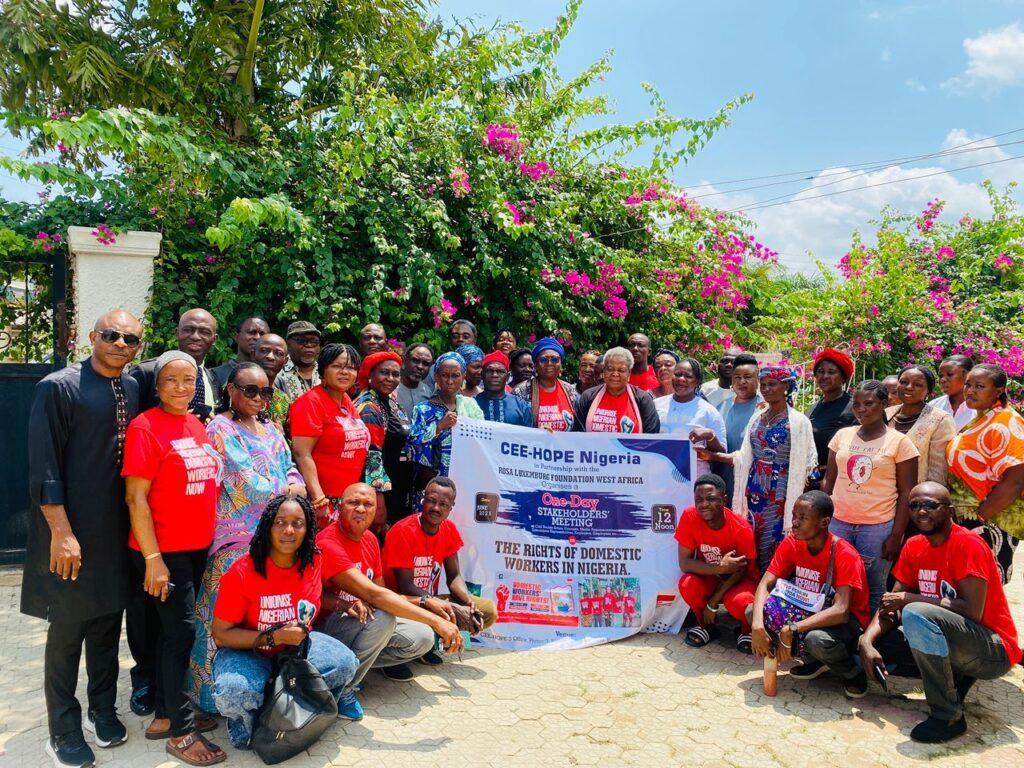A non-governmental organization, CEE-HOPE Nigeria, has called on stakeholders to prioritize the protection of domestic workers’ rights, emphasizing the need for improved working conditions, fair wages, and access to social security.
The call was made at a one-day stakeholders’ meeting on the rights of domestic workers in Nigeria, organized by CEE-HOPE Nigeria in collaboration with the Rosa Luxemburg Foundation, held in Abuja.
Founder of CEE-HOPE Nigeria, Betty Abah, advocated for the professionalisation of domestic work, stating that domestic workers deserve the same respect as other professionals.
“Domestic workers are not subhuman. Domestic work, like nursing or teaching, is a profession — and that is how it should be regarded in Nigeria,” she said.
Abah decried the rising cases of sexual abuse of domestic workers, noting that the absence of legal protections enables such violations to continue unchecked.
“There is a silent epidemic of rape. Many domestic workers are molested by their employers, who take advantage of the fact that there is no binding law to protect them. There is a bill currently before the National Assembly. We must rally support to ensure its passage. Unionisation is key to giving domestic workers a sense of self-worth,” she added.
She cited the International Labour Organization’s position, which affirms that no domestic worker should be treated as a servant or second-class citizen, but should be accorded dignity and respect.
The group highlighted the vulnerability of domestic workers — particularly women and children — to exploitation and abuse.
Country Manager of the Rosa Luxemburg Foundation West Africa, Angela Ogodo-Odah, condemned the sexual abuse of domestic staff and stressed the need to define their roles clearly.
“Your domestic staff are there to work, not to be used as sex objects. House helps are employed for specific tasks, not to carry the entire burden of a household,” she said.
She also urged neighbours to speak up when they witness domestic workers being mistreated, saying silence makes them complicit.
Labour activist and researcher, Hauwa Mustapha, commended the organisers for bringing attention to the plight of vulnerable groups. She, however, noted that gathering data on domestic workers remains difficult due to their limited accessibility.
“Domestic workers play a vital role in homes, yet they are often denied rest and dignity. In South Africa, for instance, they work for a regulated eight hours. We need to give domestic workers the power and dignity they deserve — and this begins with unionism,” she said.
Comrade Ismail Bello, National General Secretary of the Nigeria Labour Congress (NLC), echoed similar sentiments, stating that unionisation is key to empowering domestic workers.
“Domestic workers, most of whom are young women, need to come together under a union. The power of collective bargaining can protect their rights and ensure fair treatment,” he said.
Vice President of the Nigeria Association of Women Journalists (NAWOJ), Chizoba Ogbeche, stressed the importance of training journalists to report domestic labour issues accurately and from an informed perspective.
The stakeholders collectively urged the National Assembly to expedite the passage of the bill protecting domestic workers and emphasized the need for continued collaboration to promote their dignity, safety, and well-being.















